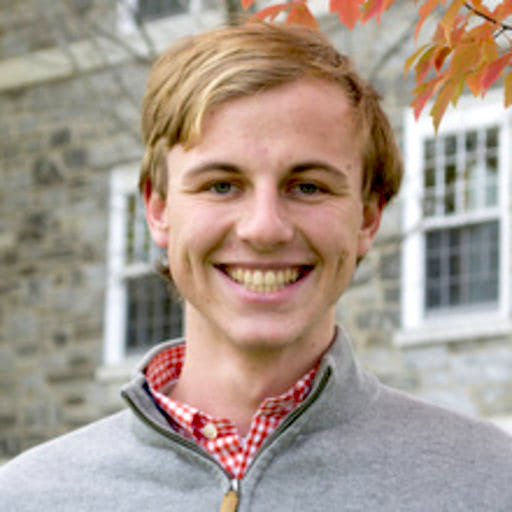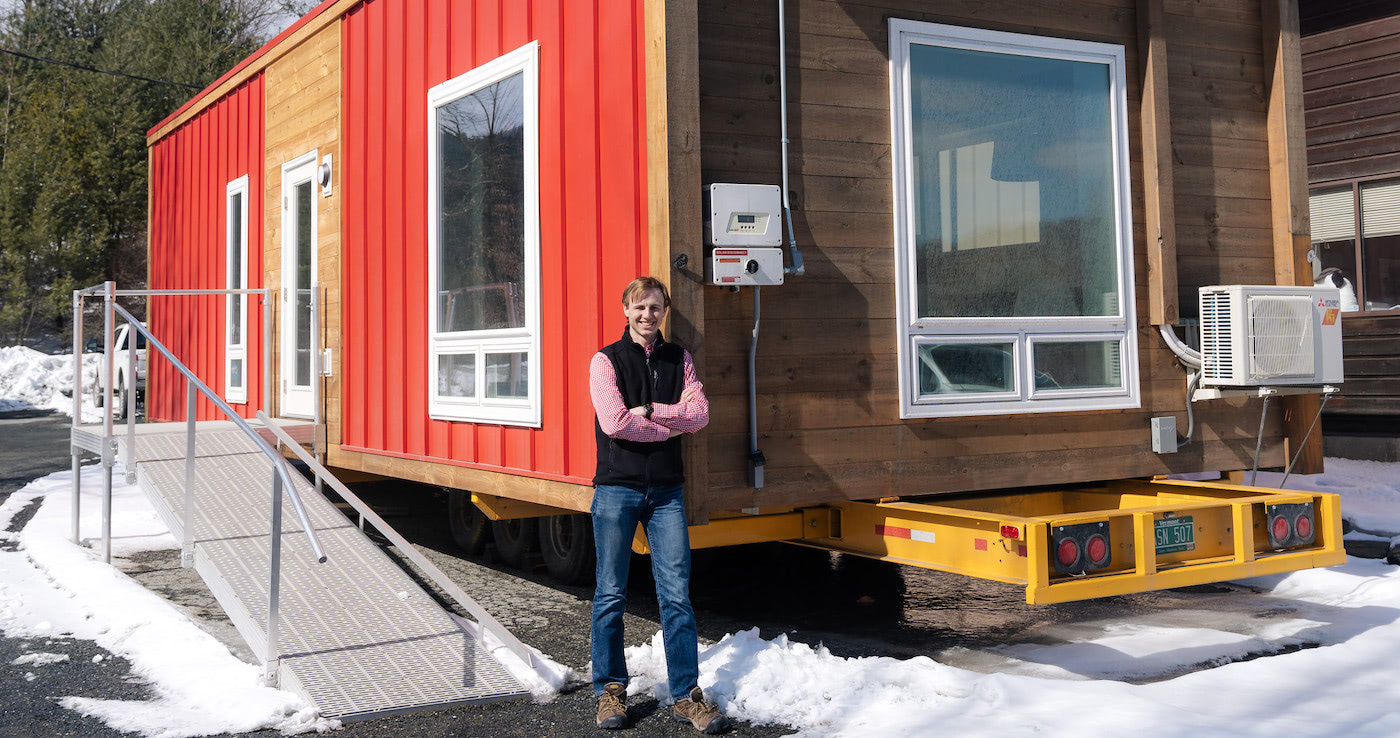- Undergraduate
Bachelor's Degrees
Bachelor of ArtsBachelor of EngineeringDual-Degree ProgramUndergraduate AdmissionsUndergraduate Experience
- Graduate
Graduate Experience
- Research
- Entrepreneurship
- Community
- About
-
Search
All Thayer News

Zachary Berzolla '19
Improving Energy Use and Access in the U.S. and Abroad
Mar 27, 2019 | by Charlotte Albright | Dartmouth News
The Irving Institute, along with other funders, is supporting student research.

Zachary Berzolla '19 at VERMOD Homes (Photo by Eli Burakian '00)
Zachary Berzolla Th’19 believes energy-efficient modular homes should be cheaper to build—and to buy. Berzolla, a Middlebury College graduate who will earn his bachelor’s of engineering this year, has been using a grant from the Arthur L. Irving Institute for Energy and Society to help a modular housing manufacturer in Wilder, Vt., create a manual that will help similar companies find efficiencies in their construction processes.
Across the globe, in a South African village—also with help from the Irving Institute and several other College funders—Jordan Swett ’19 has been studying how electricity costs are impeding access to water and sanitation.
Irving Institute director Elizabeth Wilson says Berzolla and Swett are using the institute’s first round of student mini-grants—up to $1,000 per project—to help bring about measurable, positive change in the way energy is produced and consumed in two very different communities.
Making Energy-Efficient Housing Less Expensive in the U.S.

Zachary Berzolla '19
Berzolla is interested in green architecture and construction—specifically, how buildings “can be part of the power grid, not only by drawing electricity, but also as active participants in supporting the grid’s transition to 100 percent renewables.”
At the National Renewable Energy Lab in Colorado, dedicated to research and deployment of renewable energy technologies, Berzolla worked to promote the building of energy-efficient schools across the country. “The No. 1 obstacle was cost,” he says. And one way to reduce cost is modular construction, because factory-made homes can be pre-fabricated with minimal human labor and assembled fairly quickly on a site.
“I started working with Efficiency Vermont consultants and the Vermont Manufacturing Extension Center to learn how Vermod has been making their construction process more efficient, so they can pass those savings on to customers,” says Berzolla. For the past year, he’s been documenting those efficiencies by creating a manual and 3-D models other companies can use.
“This project is about energy, yes, but really it’s about people,” says Berzolla. “These homes offer a healthy, bright environment for their occupants, and the more affordable they are, the more people will buy them.”
Improving Access to Clean Water and Sanitation in South Africa
Swett, who is majoring in environmental studies with a minor in in developmental economics, traveled last fall with an environmental studies foreign study program to Bushbuckridge, a small community that encompasses part of Kruger National Park in northeastern South Africa.
“I knew that there were a lot of problems with water and sanitation in parts of South Africa, so I worked on the topic for six weeks,” says Swett. “Everywhere I went I interviewed people, and I found out that many villagers do not have reliable access to clean water—not even from public taps.”
The problem, Swett was surprised to learn, is not that water is in short supply. The problem is with distribution. Some water and sewer systems are powered by electricity from hydropower plants many miles away, making access expensive. With funding from the Environmental Studies Program’s Paulson Fellowship for Foreign Study, the Nelson A. Rockefeller Center for Public Policy, the Andrew W. Mellon Foundation, the Leslie Center for the Humanities, and a Raynolds International Expedition grant, Swett made two more trips to the region, deepening and broadening his research. With his Irving Institute grant, he expanded his knowledge about energy-distribution systems by attending two major energy conferences in Houston.
“The big ‘aha’ for me was to realize that when we talk about energy, we are always talking about a lot of other issues, as well,” says Swett. In rural South Africa, for example, he sees lack of education as a fundamental barrier to clean water, because without adequate schooling, people cannot find employment they need to buy the energy required to power water systems.
“The electric infrastructure is there,” he says, “but people cannot access resources to utilize it.” Swett’s senior thesis focuses on the viability of installing solar power in rural areas of South Africa.
Finding Common Ground
Berzolla and Swett met only recently, when they presented their projects at an Irving Institute event and discovered that their interests in access to energy and other resources overlapped.
“In the future,” Swett says, “Irving will have its own building where people like Zach and I will meet much earlier in our research processes, and perhaps learn a lot from each other.”
After graduation, Swett will work in New York City for the U.S. subsidiary of Mizuho, a large Japanese bank, helping companies finance energy-infrastructure development. Berzolla will begin pursuing a PhD to study how building construction can support the transition to renewable energy.
In the meantime, Swett has been working this year with the Irving Institute to create an undergraduate energy club.
The deadline to apply for the next round of Irving Institute mini-grant applications is May 1.
Link to source:
https://news.dartmouth.edu/news/2019/03/improving-energy-use-and-access-us-and-abroad
For contacts and other media information visit our Media Resources page.
